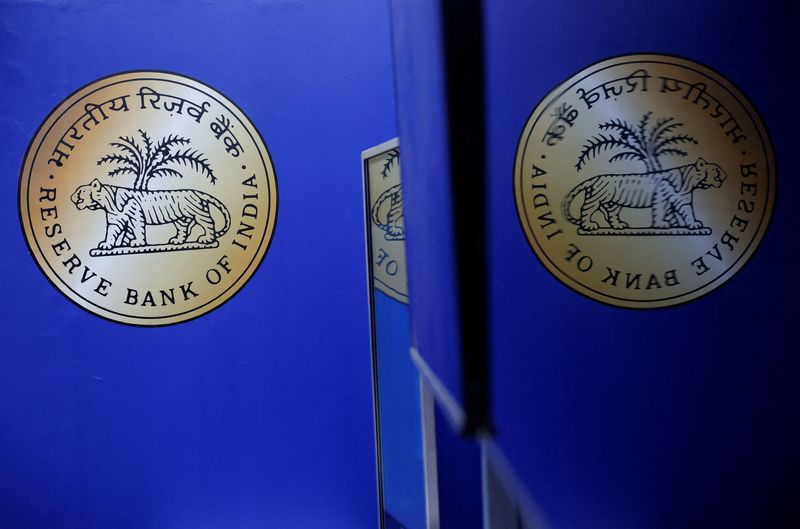By Swati Bhat and Sudipto Ganguly
MUMBAI (Reuters) -The Reserve Bank of India (RBI) kept its key interest rate unchanged on Wednesday as widely expected, but changed its policy stance to "neutral", opening the door for rate cuts as early as December.
India has lagged global peers in easing policy as inflation has remained above target due to high food prices. Central banks in developed economies, led by the U.S. Federal Reserve, in September delivered their biggest collective push on interest rate cuts since the COVID-19 pandemic.
But RBI Governor Shaktikanta Das said there was greater confidence now on the last mile of disinflation towards the central bank's 4% target.
"It is with a lot of effort that the inflation horse has been brought to the stable - that is, closer to the target," Das said, announcing the rate decision.
"We have to be very careful about opening the gate as the horse may simply bolt again. We must keep the horse on (a) tight leash so that we do not lose control," Das said.
The change in policy stance gives the central bank more "flexibility" and "optionality", Das added at a press conference which followed the statement.
"Considering the significant risks that lie ahead of us and that are staring at us, it will not be appropriate to specifically talk of the timing of a rate cut," Das said.
The Monetary Policy Committee (MPC), which consists of three RBI and three external members, kept the repo rate unchanged at 6.50% for a tenth straight policy meeting.
The committee, however, voted unanimously to change its policy stance to "neutral" from "withdrawal of accommodation".
Rates were predicted to be kept on hold by 80% of the 76 economists polled by Reuters but many expected cuts starting in December.
The MPC last changed rates in February 2023, when the policy rate was raised to 6.50%. It raised rates by a cumulative 250 basis points (bps) between April 2022 and February 2023, as the economy emerged from the COVID-19 pandemic and inflation took off.
"We continue to expect the onset of rate-easing from December with a 25-bps cut, but the scale of easing in this cycle is expected to be shallow with limited scope for back-to-back easing in each policy (meeting)," said Upasna Bhardwaj, chief economist Kotak Mahindra Bank.
IDFC FIRST Bank expects a total of 50 bps points in rate cuts by March 2025, beginning with a 25 bps cut in December.
Equity markets gained, led by interest rate sensitive sectors, and bond yields fell as the central bank indicated rate cuts ahead. The Indian rupee was marginally higher.
The central bank expects inflation to average 4.5% in the financial year 2024-25, unchanged from the forecast provided at the August meeting.
Annual retail inflation remained below the central bank's target of 4% for a second consecutive month in August but is seen rising to 5% in September, according to Barclays.
The central bank will see through the upcoming "hump" carefully and then make a decision, deputy governor Michael Patra said at the post-policy press conference.
While the recent escalation of tensions in the Middle East has shrouded the outlook on the inflation trajectory, concerns about economic growth have also begun to emerge.
High-frequency indicators such as the manufacturing PMI slowed to an eight-month low in September, while the services PMI eased to a 10-month trough, latest data showed. India's overall growth slowed to 6.7% in the June quarter.
The central bank, however, retained its GDP growth forecast for the current financial year at 7.2%. It said that prospects for private consumption, the mainstay of demand in the economy, look bright on the back of an improved agricultural outlook and rural demand.
The prevailing and expected inflation-growth balance have created conditions for a shift in the monetary policy stance, Das said. But he added that significant risks persist from adverse weather conditions, geopolitical conflict and the recent increase in some commodity prices.
The committee's latest meeting included three new external members, who were appointed for a four-year term earlier this month.
Five out of six members voted in favour of holding rates. Newly appointed Nagesh Kumar voted to cut the policy rate by 25 basis points.

In August, two of six committee members had voted for a cut in rates.
Separately, the central bank asked the country's non-bank lenders to avoid a "growth-at-any-cost" approach, adding to its warnings to the financial sector against "all forms of exuberance."